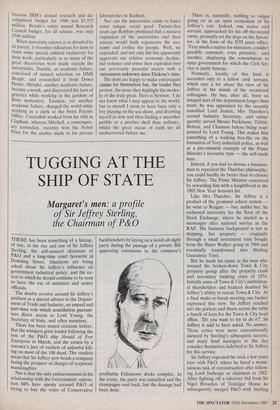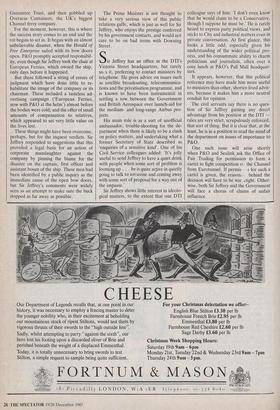TUGGING AT THE SHIP OF STATE
Margaret's men: a profile
of Sir Jeffrey Sterling,
the Chairman of P&O THERE has been something of a hiccup, of late, in the rise and rise of Sir Jeffrey Sterling, the self-assured chairman of P&O and a long-time court favourite in Downing Street. Questions are being asked about Sir Jeffrey's influence on government industrial policy, and the ex- tent to which he should continue to be seen to have the ear of ministers and senior officials.
The doubts revolve around Sir Jeffrey's position as a special adviser to the Depart- ment of Trade and Industry, an unpaid and part-time role which nonetheless guarant- tees direct access to Lord Young, the Secretary of State, and other ministers. There has been muted criticism before. But the whispers grew louder following the loss of the P&O ship Herald of Free Enterprise in March, and the return by a coroner's jury of verdicts of unlawful kill- ing on most of the 188 dead. The verdicts mean that Sir Jeffrey now heads a company facing the prospect of charges of corporate manslaughter.
Nor is that the only embarrassment in his relationship with the Government: opposi- tion MPs have openly accused P&O of trying to buy the votes of Conservative backbenchers by laying on a lavish all-night party during the passage of a private Bill approving extensions to the company's profitable Felixstowe docks complex. In the event, the party was cancelled and the champagne sent back, but the damage had been done. There is, naturally, nothing so vulgar going on as an open evaluation of Sir Jeffrey's role. Indeed, one senior civil servant, approached for his off-the-record views, promptly set the dogs on the Specta- tor, in the form of the DTI press office.
`Very much a matter for ministers; couldn't possibly comment, even privately,' said another, displaying the commitment to open government for which the Civil Ser- vice is justly famous.
Normally, loyalty of this kind is accorded only to a fellow civil servant, which says a lot about the view of Sir Jeffrey in the minds of his occasional colleagues. He has, after all, been an integral part of the department longer than most; he was appointed by the recently ennobled Lord Jenkin, Mrs Thatcher's second Industry Secretary, and subse- quently served Messrs Parkinson, Tebbit, Brittan, and Channon before being reap- pointed by Lord Young. This makes him something of a walking box-file on the formation of Tory industrial policy, as well as a pre-eminent example of the Prime Minister's favourite type — the self-made man.
Indeed, if you had to choose a business- man to represent the Thatcher philosophy, you could hardly do better than to choose Sir Jeffrey. The Prime Minister concurred by rewarding him with a knighthood in the 1985 New Year honours list.
Like Mrs Thatcher, Sir Jeffrey is a product of the grammar school system - he went to Reigate — but, unlike her, he eschewed university for the floor of the Stock Exchange, where he started as a messenger after national service in the RAF. His business background is not in shipping, but property — originally through a small investment trust bought from the Slater Walker group in 1969 and eventually transformed into Sterling Guarantee Trust.
But he made his name as the man who rescued the broken-down Town & City property group after the property crash and secondary banking crisis of 1974. Initially some of Town & City's institution- al shareholders and bankers doubted Sir Jeffrey's ability to rescue Town & City. At a final make-or-break meeting one banker expressed this view. Sir Jeffrey reached into his pockets and threw across the table a bunch of keys for the Town & City head office. 'Do you want to try to do it?' Sir Jeffrey is said to have asked. No answer. Those critics were more conventionally silenced by Sterling's subsequent success, and many fund managers to this day consider themselves indebted to Sir Jeffrey for this service.
Sir Jeffrey repeated the trick a few years later with P&O, where he faced a moun- tainous task of reconstruction after follow- ing Lord Inchcape as chairman in 1983. After fighting off a takeover bid from Sir Nigel Broackes of Trafalgar House he subsequently merged P&O with Sterling Guarantee Trust, and then gobbled up Overseas Containers, the UK's biggest Channel ferry company.
For the moment, however, this is where the success story comes to an end and the rot begins to set in. It began with an almost unbelievable disaster, when the Herald of Free Enterprise sailed with its bow doors open. P&O promptly accepted responsibil- ity, even though Sir Jeffrey took the chair at European Ferries, which owned the ship, only days before it happened.
But there followed a string of errors of judgment which have done little to re- habilitate the image of the company or its chairman. These included a tasteless ad- vertising campaign (`European Ferries, now with P&O at the helm') almost before the bodies were cold; and the offer of small amounts of compensation to relatives, which appeared to set very little value on the lives lost.
These things might have been overcome, perhaps, but for the inquest verdicts. Sir Jeffrey responded to suggestions that this provided a legal basis for an action of corporate manslaughter against the company by pinning the blame for the disaster on the captain, first officer and assistant bosun of the ship. These men had been identified by a public inquiry as the immediate cause of the open bow doors, but Sir Jeffrey's comments were widely seen as an attempt to make sure the buck stopped as far away as possible. The Prime Minister is not thought to take a very serious view of this public relations gaffe, which is just as well for Sir Jeffrey, who enjoys the prestige conferred by his government contacts, and would not care to be on bad terms with Downing Street.
it Jeffrey has an office in the DTI's Victoria Street headquarters, but rarely uscs it, preferring to contact ministers by telephone. He gives advice on issues such as satellite broadcasting, telecommunica- tions and the privatisation programme, and is known to have been instrumental in settling a row between the Government and British Aerospace over launch-aid for the medium- and long-range Airbus pro- jects.
His main role is as a sort of unofficial ambassador, trouble-shooting for the de- partment when there is likely to be a clash on policy matters, and undertaking what a former Secretary of State described as `enquiries of a sensitive kind'. One of his Civil Service colleagues added: 'It's jolly useful to send Jeffrey to have a quiet drink with people when some sort of problem is looming up . . . he is quite ac/ive in quietly going to talk to someone and coming away with some sort of proposal for a way out of the impasse.'
Sir Jeffrey shows little interest in ideolo- gical matters, to the extent that one DTI colleague says of him: 'I don't even know that he would claim to be a Conservative, though I suppose he must be.' He is rarely heard to express party political views, and sticks to City and industrial matters even in private conversation. At first glance, this looks a little odd, especially given his understanding of the wider political pro- cess, and his consummate ability to charm politicians and journalists, often over a cosy lunch at P&O's Pall Mall headquar- ters.
It appears, however, that this political reticence may have made him more useful to ministers than other, shorter-lived advis- ers, because it makes him a more neutral conduit for opinion.
The civil servants say there is no ques- tion of Sir Jeffrey gaining any direct advantage from his position at the DTI rules are very strict, scrupulously enforced, that sort of thing. But it is clear that, at the least, he is in a position to read the mind of the department on issues of importance to P&O.
One such issue will arise shortly when P&O and Sealink ask the Office of Fair Trading for permission to form a cartel to fight competition o.. the Channel from Eurotunnel. If permis , ,11 for such. a cartel is given, the reason!, behind the decision will have to be wat tight. Other- wise, both Sir Jeffrey and the Government will face a chorus of claims of unfair influence.











































































































 Previous page
Previous page